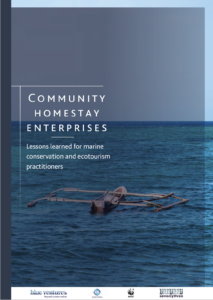Homestays are a community based tourism model that allow visitors the opportunity to experience the daily life of their host family and interact with the lived experience of local communities. This often includes community led tourist activities that offer an authentic insight into local knowledge, culture and customs. We believe homestays can have an impact beyond the sum of their parts – laying the foundations for an ecosystem of small community based businesses, building community resilience and providing a direct link between the health of the ocean and the people who rely on and want to visit it.
The widespread benefits of community based tourism models
For the community
When managed with a community-wide approach that is open, fair and transparent, homestays can bring communities together: amplifying local voices and serving as a multiplier in the community economy and diversifying alternative livelihoods.
To complement homestays, community based tourism creates opportunities for local people to provide a range of products and services, including the supply of traditional construction materials, transport, fresh produce, traditional cuisine and crafts, as well as leading activities such as diving, trekking and birdwatching.
For families
Running a family business, such as a homestay, can be an effective route towards financial independence, releasing funds for education and helping families build the confidence and capacity to safeguard their futures.
For the environment
Developing tourism focused alternative livelihoods not only reduces reliance on natural resources in the community but stimulates pride of place, environmental interest and shared passions. At Blue Ventures we’ve witnessed firsthand the impact community ambassadors can have in leading new environmental initiatives from beach cleans and recycling projects to leading habitat surveying and fisheries monitoring.
This can act as a catalyst in promoting further long-term interest in locally led marine management initiatives, in turn, delivering benefits back into the community through improved catches and increased ecotourism demand.
For tourists
Homestays offer tourists the opportunity to experience rural areas of outstanding natural beauty, often far removed from the typical tourist trail, in an authentic and meaningful cultural exchange.
These models are initiated and run by the communities, who are proud to introduce new people to their way of life and share their local knowledge. In addition to this, tourists know that their money is going directly to the community and contributing to safeguarding the protection of livelihoods and the surrounding ecosystems.
At Blue Ventures we develop innovative and transformative approaches for nurturing and sustaining locally led marine conservation. We work with under-served communities to build resilience in the face of growing global emergencies and utilise our experience in building adaptive alternative livelihood models that meet community needs, diversify income opportunities and promote sustainable practices that benefit people and nature alike.
“In small-scale fishing communities, homestays have proven to be an inclusive and rewarding community initiative that provides reliable income for families that are amongst some of the most vulnerable to our changing climate, public health emergencies and depleted fish stocks. Homestays can act as a catalyst to diversifying local livelihoods, building new opportunities and developing sustained community led marine protection.
Ryan Lewis, Technical Advisor Ecotourism Business Development and Marketing, Blue Ventures
The six pillars to an effective homestay model










A structure that supports the shared vision and values of the community builds trust and creates shared responsibilities. A mutual understanding that setting high standards across all tourism activities improves livelihoods and protects natural resources for everyone in the community.


Being a homestay host is a good job. It requires less than being a fisherman and has opportunities for growth in the future. Homestays also benefit the entire community as well as other villages, not just the host families. For example, we use part of our income to buy fruits and vegetables for the guests to eat. This brings income to other community members and other communities.”
Estevao, Homestay Owner, Atauro Island, Timor-Leste
Learning through shared experiences
Although every community based tourism model should be tailored to that community, there are a number of shared challenges and learning opportunities. Community exchanges, both national and international, have proved to be a highly effective tool in developing homestay standards, identifying areas for improvement, and building confidence through training and shared learning.
First inspired by a set of exchange visits over 2017 and 2018 between community representatives from Raja Ampat (Indonesia), Atauro Island (Timor-Leste) and Tun Mustapha Park (Malaysia) and funded by WWF, Blue Ventures has co-created a homestay and community based tourism manual jointly authored by Seventy Three, Blue Ventures, Yayasan Barunastra and WWF Malaysia.
This homestay toolkit sets out a number of key considerations that local communities, and their partners in government and civil society, might wish to take into account when deciding whether and how to develop a community based tourism venture.
Share this:

